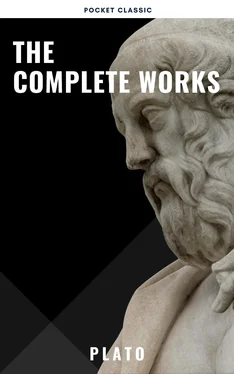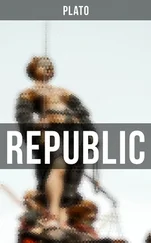Protagoras himself thought that they would.
Well then, my friends, I say to them; seeing that the salvation of human life has been found to consist in the right choice of pleasures and pains, —in the choice of the more and the fewer, and the greater and the less, and the nearer and remoter, must not this measuring be a consideration of their excess and defect and equality in relation to each other?
This is undeniably true.
And this, as possessing measure, must undeniably also be an art and science?
They will agree, he said.
The nature of that art or science will be a matter of future consideration; but the existence of such a science furnishes a demonstrative answer to the question which you asked of me and Protagoras. At the time when you asked the question, if you remember, both of us were agreeing that there was nothing mightier than knowledge, and that knowledge, in whatever existing, must have the advantage over pleasure and all other things; and then you said that pleasure often got the advantage even over a man who has knowledge; and we refused to allow this, and you rejoined: O Protagoras and Socrates, what is the meaning of being overcome by pleasure if not this?—tell us what you call such a state:—if we had immediately and at the time answered ‘Ignorance,’ you would have laughed at us. But now, in laughing at us, you will be laughing at yourselves: for you also admitted that men err in their choice of pleasures and pains; that is, in their choice of good and evil, from defect of knowledge; and you admitted further, that they err, not only from defect of knowledge in general, but of that particular knowledge which is called measuring. And you are also aware that the erring act which is done without knowledge is done in ignorance. This, therefore, is the meaning of being overcome by pleasure; —ignorance, and that the greatest. And our friends Protagoras and Prodicus and Hippias declare that they are the physicians of ignorance; but you, who are under the mistaken impression that ignorance is not the cause, and that the art of which I am speaking cannot be taught, neither go yourselves, nor send your children, to the Sophists, who are the teachers of these things—you take care of your money and give them none; and the result is, that you are the worse off both in public and private life:—Let us suppose this to be our answer to the world in general: And now I should like to ask you, Hippias, and you, Prodicus, as well as Protagoras (for the argument is to be yours as well as ours), whether you think that I am speaking the truth or not?
They all thought that what I said was entirely true.
Then you agree, I said, that the pleasant is the good, and the painful evil. And here I would beg my friend Prodicus not to introduce his distinction of names, whether he is disposed to say pleasurable, delightful, joyful. However, by whatever name he prefers to call them, I will ask you, most excellent Prodicus, to answer in my sense of the words.
Prodicus laughed and assented, as did the others.
Then, my friends, what do you say to this? Are not all actions honourable and useful, of which the tendency is to make life painless and pleasant? The honourable work is also useful and good?
This was admitted.
Then, I said, if the pleasant is the good, nobody does anything under the idea or conviction that some other thing would be better and is also attainable, when he might do the better. And this inferiority of a man to himself is merely ignorance, as the superiority of a man to himself is wisdom.
They all assented.
And is not ignorance the having a false opinion and being deceived about important matters?
To this also they unanimously assented.
Then, I said, no man voluntarily pursues evil, or that which he thinks to be evil. To prefer evil to good is not in human nature; and when a man is compelled to choose one of two evils, no one will choose the greater when he may have the less.
All of us agreed to every word of this.
Well, I said, there is a certain thing called fear or terror; and here, Prodicus, I should particularly like to know whether you would agree with me in defining this fear or terror as expectation of evil.
Protagoras and Hippias agreed, but Prodicus said that this was fear and not terror.
Never mind, Prodicus, I said; but let me ask whether, if our former assertions are true, a man will pursue that which he fears when he is not compelled? Would not this be in flat contradiction to the admission which has been already made, that he thinks the things which he fears to be evil; and no one will pursue or voluntarily accept that which he thinks to be evil?
That also was universally admitted.
Then, I said, these, Hippias and Prodicus, are our premisses; and I would beg Protagoras to explain to us how he can be right in what he said at first. I do not mean in what he said quite at first, for his first statement, as you may remember, was that whereas there were five parts of virtue none of them was like any other of them; each of them had a separate function. To this, however, I am not referring, but to the assertion which he afterwards made that of the five virtues four were nearly akin to each other, but that the fifth, which was courage, differed greatly from the others. And of this he gave me the following proof. He said: You will find, Socrates, that some of the most impious, and unrighteous, and intemperate, and ignorant of men are among the most courageous; which proves that courage is very different from the other parts of virtue. I was surprised at his saying this at the time, and I am still more surprised now that I have discussed the matter with you. So I asked him whether by the brave he meant the confident. Yes, he replied, and the impetuous or goers. (You may remember, Protagoras, that this was your answer.)
He assented.
Well then, I said, tell us against what are the courageous ready to go— against the same dangers as the cowards?
No, he answered.
Then against something different?
Yes, he said.
Then do cowards go where there is safety, and the courageous where there is danger?
Yes, Socrates, so men say.
Very true, I said. But I want to know against what do you say that the courageous are ready to go—against dangers, believing them to be dangers, or not against dangers?
No, said he; the former case has been proved by you in the previous argument to be impossible.
That, again, I replied, is quite true. And if this has been rightly proven, then no one goes to meet what he thinks to be dangers, since the want of self-control, which makes men rush into dangers, has been shown to be ignorance.
He assented.
And yet the courageous man and the coward alike go to meet that about which they are confident; so that, in this point of view, the cowardly and the courageous go to meet the same things.
And yet, Socrates, said Protagoras, that to which the coward goes is the opposite of that to which the courageous goes; the one, for example, is ready to go to battle, and the other is not ready.
And is going to battle honourable or disgraceful? I said.
Honourable, he replied.
And if honourable, then already admitted by us to be good; for all honourable actions we have admitted to be good.
That is true; and to that opinion I shall always adhere.
True, I said. But which of the two are they who, as you say, are unwilling to go to war, which is a good and honourable thing?
The cowards, he replied.
And what is good and honourable, I said, is also pleasant?
It has certainly been acknowledged to be so, he replied.
And do the cowards knowingly refuse to go to the nobler, and pleasanter, and better?
The admission of that, he replied, would belie our former admissions.
But does not the courageous man also go to meet the better, and pleasanter, and nobler?
Читать дальше












